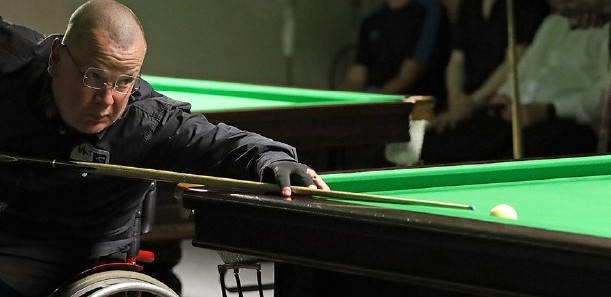Sport for Confidence & WPBSA Launch Inclusive Snooker Guide
Posted on 28th November 2022 at 10:12
The World Professional Billiards and Snooker Association (WPBSA) held an exciting launch event at the Cazoo UK Championship earlier this month to announce the publication of a new booklet showcasing the health benefits of snooker.
The WPBSA teamed up with Sport for Confidence CIC to design and publish the first Therapeutic Guide to Snooker, which demonstrates snooker’s positive contribution to physical, social and mental wellbeing.
The content is guided by principles of occupational therapy and physiotherapy to encourage connection with the health, sport, leisure and community sectors. Its purpose is for use by health professionals, sports coaches, community snooker groups, schools and other interested groups.
Participation in snooker has rarely been fully considered for the contribution it can make to people’s health and wellbeing. This new Guide provides evidence-based information demonstrating the positive influence snooker can have on everyone in society, particularly those with disabilities and other groups who may experience barriers to taking part in sport.
Snooker, played in a supportive, person-centred environment, can promote many occupational outcomes from building friendships and growing self-confidence to mental resilience and discipline. The sport offers a chance to build social capital, through meeting new people, forming friendships and generally engaging with the wider community.
The guide is endorsed by Sport England, the Royal College of Occupational Therapists (RCOT) and the Chartered Society of Physiotherapy, with plans to disseminate the information to 40,000 Occupational Therapists, encouraging more community use of snooker clubs and engagement via social prescribing programmes.
It offers practical advice on how to structure snooker activities to engage people of all ability levels, both in groups and as individuals.
The launch event saw attendance from members of the Sport for Confidence team who have compiled the Guide, through academic research and visits to existing snooker projects.
Chris Whitaker, a Head of Disability at Sport England, was present at the York Barbican event, while World Snooker Tour professional Shaun Murphy also gave his backing to the publication. Both spent considerable time talking about the importance of the Guide for the sport.
WPBSA Chairman Jason Ferguson is backing the guide to open up new partnerships and funding opportunities for snooker development programmes, stating: “We’re thrilled to be launching this Therapeutic Guide to Snooker.
“This is born out of a collaboration with Sport for Confidence who have successfully worked with a number of major sporting governing bodies to showcase the contribution sport can make to people’s health and wellbeing.
“We’ve been banging the drum for a long time for recognition of snooker’s benefits to community and society. We now have a significant piece of evidence to back that up and to insist that we start conversations with key organisations that form strategy and funding programmes associated with sport for development.”
The therapeutic guide also offers insight into the lives of people already playing snooker, showcasing a number of case studies involving players from a range of backgrounds.
These are intended to inspire people from all areas of society to pick up a cue and give snooker a try, while also demonstrating the need for coaches to embark on community group activities alongside private sessions.
This is a point supported by WPBSA Club and Facilities Manager Bob Hill, who commented: “We’re aiming for people to see snooker differently after reading this guide.
“Within our sport, it will encourage a more diverse approach to how we engage with people in different communities. Outside our sport, this guide will persuade more community organisations and health sector bodies to start engaging with snooker and referring people into local snooker clubs and groups.”
Liz Fletcher, Educational Development Lead, Sport For Confidence, who has led the co-creation of the guide with healthcare students, said: “Snooker can be played from both a standing and a seated position, making it accessible to almost everyone. It requires discipline, skill, concentration, patience and practice – all attributes which, once mastered, can be applied to other aspects of life which stretch way beyond the game itself.
“When taken out of a competitive context and placed in a therapeutic one, it becomes clear that there are many physical, mental and social benefits associated with playing snooker that can extend into everyday life and empower more people to live healthier, happier and more fulfilling lives.
“This Guide is designed to help health professionals embed the sport into care and treatment programmes, extending its reach and influencing those who may otherwise not get an opportunity to participate.”
Download your FREE copy of The Therapeutic Value of Snooker here
Share this post:







